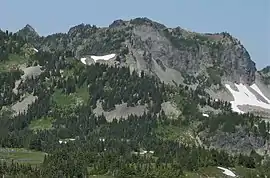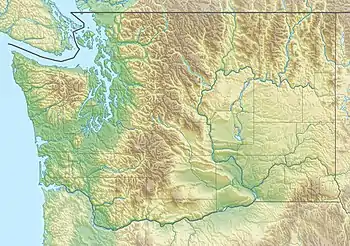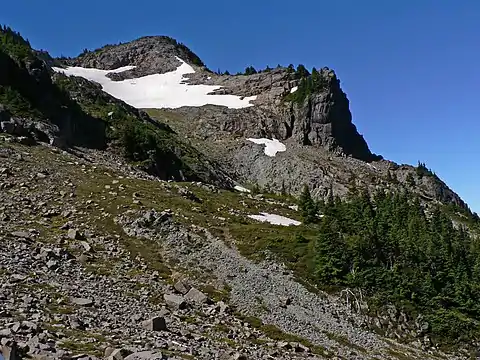Fay Peak
Fay Peak is a double-summit mountain located in Mount Rainier National Park, in Pierce County of Washington state.[5] It is part of the Cascade Range, and lies 7 mi (11 km) northwest of the summit of Mount Rainier. The 6,492-foot elevation summit of Fay Peak lies a quarter-mile west of the highest point, East Fay Peak, 6,520+ ft (1,990+ m).[2] Echo Rock is its nearest higher neighbor, 2.7 mi (4.3 km) to the southeast.[1] Precipitation runoff from Fay Peak is drained by Cataract Creek on the east side of the mountain, and the west side drains into Mowich Lake and Mowich River.
| Fay Peak | |
|---|---|
 Fay Peak upper left, East Fay Peak centered. | |
| Highest point | |
| Elevation | 6,492 ft (1,979 m) [1] |
| Prominence | 520 ft (160 m) [2] |
| Parent peak | Old Desolate (7,137 ft)[3] |
| Isolation | 0.26 mi (0.42 km) [3] |
| Coordinates | 46°55′56″N 121°50′56″W |
| Geography | |
 Fay Peak Location of Fay Peak in Washington  Fay Peak Fay Peak (the United States) | |
| Location | Mount Rainier National Park Pierce County, Washington, U.S. |
| Parent range | Cascades |
| Topo map | USGS Mowich Lake |
| Climbing | |
| First ascent | August 15, 1884 |
| Easiest route | class 2 scrambling west ridge[4] |
History
This mountain's name honors Fay Fuller (1869–1958), the first woman to stand atop the summit of Mount Rainier.[6] Her first successful ascent occurred on August 10, 1890, and her second on July 27, 1897. The name Fay Peak first appeared on a map of the mountain published in 1895.[7] The name was officially adopted in 1913 by the United States Board on Geographic Names.[5]
The first ascent of this peak was made August 15, 1884, by J. Warner Fobes, George James, and R. O. Wells.[4]
Climate
Fay Peak is located in the marine west coast climate zone of western North America.[6] Most weather fronts originate in the Pacific Ocean, and travel northeast toward the Cascade Mountains. As fronts approach, they are forced upward by the peaks of the Cascade Range (Orographic lift), causing them to drop their moisture in the form of rain or snowfall onto the Cascades. As a result, the west side of the Cascades experiences high precipitation, especially during the winter months in the form of snowfall. During winter months, weather is usually cloudy, but, due to high pressure systems over the Pacific Ocean that intensify during summer months, there is often little or no cloud cover during the summer. The months July through September offer the most favorable weather for viewing or climbing this peak.
Gallery
.JPG.webp) Fay Peak from Mowich Lake
Fay Peak from Mowich Lake Fay Peak from Knapsack Pass
Fay Peak from Knapsack Pass
References

- "Fay Peak, Washington". Peakbagger.com.
- "East Fay Peak, Washington". Peakbagger.com.
- "Fay Peak - 6,492' WA". listsofjohn.com. Retrieved 2020-07-16.
- "Fay Peak". Bivouac.com. Retrieved 2020-07-16.
- "Fay Peak". Geographic Names Information System. United States Geological Survey. Retrieved 2020-07-16.
- Beckey, Fred W. Cascade Alpine Guide, Climbing and High Routes. Seattle, WA: Mountaineers Books, 2008.
- Mount Rainier National Park Place Names. Gary Fuller Reese (author), 2009.
External links
- National Park Service web site: Mount Rainier National Park
- Fay Peak: weather forecast